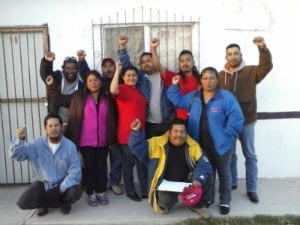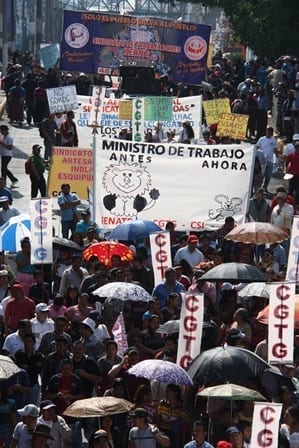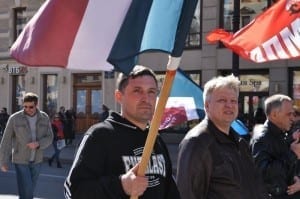Jun 20, 2013

Ten workers fired for union activity have refused severance pay. Credit: CFO
An international auto parts production plants has violated worker rights numerous times with actions that include a retaliatory mass firing and interference with union elections, according to a new report by the Worker Rights Consortium (WRC).
Since August 2011, the actions of Arneses y Accesorios de Mexico have “represented serious and clear-cut violations of international labor standards as embodied in the conventions of the International Labor Organization, as well as the codes of conduct of several of PKC’s customer firms,” according to the report.
In December, the Finnish-owned PKC fired more than 100 union supporters at Arneses y Accesorios, including the entire union committee, for campaigning for the election of an independent trade union, the National Union of Mine and Metalworkers (known as “Los Mineros”), a Solidarity Center partner, at their plants in Ciudad Acuña, Mexico. According to Los Mineros, the “workers were called individually to the human resources office and told to sign a ‘voluntary’ resignation letter. Officials of the Federal Labor Board were present and encouraged the workers to sign.” The union says workers were told that “the company has decided it no longer needs your services.”
The report found that the company denied workers the opportunity to exercise their right to freely join a union and bargain collectively by:
• Installing a so-called protection contract with the Confederación de Trabajadores de México (Confederation of Workers of Mexico, CTM), and subsequently using the agreement to prevent workers from freely exercising their associational rights. The CTM is a labor organization with a history of acting as “protection union” by assisting employers in blocking independent unionization efforts.
• Engaging in anti-union harassment and intimidation in the lead-up to a union election in October 2012. Such actions included directing managers to issue anti-union threats and hold captive audience meetings to dissuade workers from joining Los Mineros.
• Manipulating the union election by hiring short-term employees and directing them to vote for CTM.
The report also documented sexual harassment of women workers, who “provided credible testimony that Arneses y Accesorios managers pressured them to engage in sexual relations in exchange for promotions or other work benefits.”
The 20-page report lists recommendation for restoring worker rights at Arneses y Accesorios, which include immediately reinstating all workers dismissed in retaliation for exercising their right to freely associate and providing them with back pay.
Read the full report.

Jun 14, 2013
Workers this week are marking the second anniversary of the historic passage of a global standard covering the rights of domestic workers. The International Labor Organization (ILO) “Decent Work for Domestic Workers Convention (No. 189) covers written employment contracts, protection from harassment, abuse and violence, hours of work, job safety and other workplace safeguards.
As in many countries around the world, domestic workers and their supporters in the Dominican Republic are campaigning for ratification of Convention 189. When a country signs the convention, it agrees to abide by its rules. Seven nations have ratified it in the past two years, a number that illustrates the challenges domestic workers face in achieving their rights on the job. In the Dominican Republic, domestic workers’ struggle for recognition of their rights on the job has involved decades of hard work, strategic coalition building, broad public outreach and much perseverance.
In 1989, the Asociaciün de Trabajadores (Domestic Workers Association, ATH), a non-governmental organization, sought to modify the nation’s employment law to include domestic workers. Early on in that campaign, ATH reached out to numerous women’s rights group for support and built a strong coalition which engaged in widespread media outreach—through posters, leaflets, seminars, workshops and press coverage. The campaign enlisted the backing of popular television personalities who served as well-known proponents appreciated by Dominican decision-makers and the populace.
Passage of the law in 1992 culminated “an arduous struggle” to convince members of Congress “that domestic workers were a fundamental part of society,” says Elena Andrea Pérez García, ATH organizational secretary. ATH, which now represents more than 3,500 members, affiliated in 2010 with the Confederaciün Nacional de Unidad Sindical (National Confederation of Labor Union Unity, CNUS).
One of the main roadblocks for domestic workers in the Dominican Republic, as elsewhere around the world, is overcoming the perception that because their labor takes place within a home, it is not “real” work. Some 90 percent of the 300,000 domestic workers in the Dominican Republic are women, and female immigrants, primarily from Haiti, comprise between 10 percent and 33 percent of domestic workers.
“In remunerated domestic work, which is performed mainly by women, social subordination and machista cultural stereotypes play a major role, as does the social devaluation of domestic work,” says Max Puig, who served as Dominican Republic Minister of Labor from 2008 to 2011.
In 2011, CNUS and a coalition of other unions and organizations helped move a bill to Congress that would provide domestic workers with social security coverage. Eulogia Familia, vice president of the 500,000-member CNUS, said getting the bill introduced involved “one-on-one interviews with key legislators to raise awareness” and meetings with government agencies responsible for shaping the legislation. Domestic workers’ participation was fundamental to these meetings, enabling legislators and policy-makers tolearn firsthand about the often daunting working conditions the women face. Further, says Familia, domestic workers could convince legislators “that they and their families are an important social group and that their vote will help elect” them. Following this outreach, the National Social Security Council issued a resolution to conduct studies on the best way to incorporate domestic workers into the social security system.
Domestic workers, energized by passage of Convention 189, are pushing hard for its ratification in the Dominican Republic—and are well positioned to do so. They are the women who leafleted, held meetings and reached out to the public for years in multiple campaigns, becoming empowered in the process.
Isolated behind the closed doors of private households, domestic workers are difficult to locate and gather in networks where they could learn their rights as working people, share experiences and gain confidence in their ability to improve workplace conditions. Outreach to this overlooked workforce by ATH and CNUS and their partners changed all that.
This report is an excerpt from the report, Dominican Republic: Domestic Workers Struggle for Rights. The report is part of Catalyst for Change, a Solidarity Center series supported by the National Endowment for Democracy. The series features the working people, their unions and activists who are advancing worker rights and greater equity in their societies. Their experience and efforts provide real, transferable lessons for others seeking to affect positive change.
May 23, 2013

With few or no safety measures in place, Ukraine has the world’s highest coal mine deaths.
Freedom of association and the ability of civil society organizations to fully function in Ukraine are in jeopardy as the country increasingly moves away from democracy. Only international attention and solidarity have slowed these disturbing trends.
“There is constant pressure on non-governmental organizations (NGOs) from oligarchs, media, the security system and the courts,” said Mykhailo Volynets, chairman of the Confederation of Free Trade Unions of Ukraine (KVPU).
Volynets, who met with Solidarity Center staff in Washington, D.C., as part of a recent visit to the United States, described an environment of more subtle pressure against NGOs than practiced in Russia, where a new law passed in January severely restricts their operation.
Yet attacks on worker rights and the nation’s blossoming free trade movement have not been as subtle. A proposed labor code would legalize lockouts, allow unlimited work days and weeks, and enable employers to monitor workers at the workplace. The draft code is so ambiguous, said Volynets, “employers will always find a provision that is beneficial” to them. Further, workers and their unions have no recourse in the courts, because “90 percent of court rulings are so unfair, they side with the employers and authorities.
“The authorities are creating a situation in which civil society cannot develop. Specifically, unions can’t develop,” said Volynets, whose confederation is one of the few dynamic civil society organizations in Ukraine.
The KVPU, a Solidarity Center partner, has a strong presence in regions were few other progressive civil society groups have reach.
Worsening worker rights has resulted in a growing “shadow economy,” with 30 percent to 40 percent of wages paid off the books, Volynets estimates. Those who support themselves through such work will never have pensions, he says. In addition, some 30 percent of young workers under age 25 never have had a job, said Volynets, and their future is bleak.
Volynets, who also heads Ukraine’s Independent Trade Union of Miners, described the potentially deadly conditions in the nation’s nonunion mines, where miners work deep underground in areas that often lack structural support and have little or no safety measures in place. Volynets estimates some 50,000 Ukrainians labor in such mines. Ukraine has the world’s highest coal industry death rate. In 2011, 161 Ukrainian coal miners died in workplace accidents. Ukraine’s mining industry has become a major part of the national economy in recent years, accounting for roughly 4.4 percent of the country’s gross domestic product (GNP). The increasing difficulty workers face in forming unions means miners at these dangerous worksites have no collective voice to challenge unsafe working conditions.
Volynets, the 2004 recipient of the AFL-CIO George Meany-Lane Kirkland Human Rights Award and a former member of the Ukrainian parliament, also offered a measure of hope when he cited instances in which government efforts to restrict worker rights were rescinded after international union support. In the most recent example, a 2012 law that effectively prohibited much collective bargaining was rescinded after the KVPU filed a complaint with the International Labor Organization (ILO).
May 17, 2013

Workers rally for justice for murdered trade unionists during May Day events in Guatemala City. Credit: Stephen Wishart
Worker rights groups are urging the Guatemalan government to bring justice to the families of the more than 56 trade union leaders killed in the past three years. No one has ever been convicted in Guatemala for killing a union leader.
The Trade Union Confederation of the Americas (TUCA) has written to President Otto Perez Molina asking for action to resolve the murders of union leaders and for a commitment to guarantee the right to freedom of association and collective bargaining. TUCA, the regional structure of the International Trade Union Confederation (ITUC), represents more than 50 million workers.
In the letter, TUCA states the murders and the numerous acts of torture, kidnappings, raids and death threats have created a culture of fear and violence throughout the country accompanied by an unrelenting series of violations of freedom of association and the right to collective bargaining.
TUCA also writes that the global trade union movement was surprised by the 2013 Report by the International Labor Organization Committee of Experts which cited the government’s progress in resolving numerous cases.
“While progress was reported in these cases, the report fails to share information on concrete results or sentences in a single case. Of most concern is that of the 58 killings admitted by the government over the last six years, only in two cases has the government declared trade union activities as the motive. The other deaths are included among the so-called common crimes such as ‘extortion,’ ‘personal differences’ or ‘crimes of passion.’”
Over the past 20 years, the international community has appealed to the Guatemalan government to address serious human rights violations, to little effect. In addition, Guatemalan unions have sent detailed recommendations for improved labor rights compliance to its government, filed under the Dominican Republic-Central American Free Trade Agreement (DR-CAFTA) complaint process. In 2008, six Guatemalan trade unions filed a complaint about the suppression of worker rights under the trade agreement. The case advanced to the dispute resolution phase in 2011 and is still pending.
TUCA writes that the Rios Montt verdict, “achieved through a profound mobilization of Guatemalan civil society, must now be consolidated, and extended to all sectors of society who suffer the weight decades of violence and impunity. The labor movement, in particular, continues to be one of the main targets of this repression.”
May 13, 2013

Russian trade unionist Valentin Urusov won the 2013 Svensson Prize for Trade Union Rights. Credit: Russian Confederation of Labor
Valentin Urusov, the Russian electrician and trade unionist unjustly imprisoned for years in a Siberian penal colony, received the international Arthur Svensson Prize for Trade Union Rights in 2013. Urusov led the trade union Profsvoboda at Alrosa, the world’s second largest diamond mining company, based in the northern Sakha province of Russia.
Urusov, who was released from prison in March—after he was nominated for the prize—was jailed in 2008 for allegedly possessing narcotics. However, his arrest coincided suspiciously with preparations for a protest rally by workers at the state-owned Alrosa—a rally which Urusov helped organize. He was sentenced to six years in a penal colony.
In awarding the prize, given by the Norwegian trade union movement, committee chairman Lief Sande said “Urusov has become symbolic of the struggle for workers’ rights and freedom of association in Russia.”
Further, the award committee noted its concern about the workers’ rights situation in Russia, writing, “Freedom of association and the right to strike have long been under pressure, and “it may appear that conditions are deteriorating further.”
The global union, IndustriAll, a strong voice among unions leading the fight for Urusov’s release, congratulated Urusov, calling him a “heroic Russian trade unionist.”
The prize is named for the former leader of the Norwegian Union of Chemical Industry Workers, Arthur Svensson, who was especially engaged in international solidarity.





